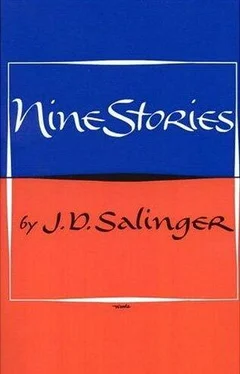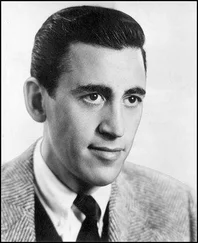Jerome Salinger - Nine Stories
Здесь есть возможность читать онлайн «Jerome Salinger - Nine Stories» весь текст электронной книги совершенно бесплатно (целиком полную версию без сокращений). В некоторых случаях можно слушать аудио, скачать через торрент в формате fb2 и присутствует краткое содержание. Год выпуска: 1953, Издательство: Little Brown, Жанр: Классическая проза, на английском языке. Описание произведения, (предисловие) а так же отзывы посетителей доступны на портале библиотеки ЛибКат.
- Название:Nine Stories
- Автор:
- Издательство:Little Brown
- Жанр:
- Год:1953
- ISBN:нет данных
- Рейтинг книги:4 / 5. Голосов: 2
-
Избранное:Добавить в избранное
- Отзывы:
-
Ваша оценка:
- 80
- 1
- 2
- 3
- 4
- 5
Nine Stories: краткое содержание, описание и аннотация
Предлагаем к чтению аннотацию, описание, краткое содержание или предисловие (зависит от того, что написал сам автор книги «Nine Stories»). Если вы не нашли необходимую информацию о книге — напишите в комментариях, мы постараемся отыскать её.
Nine Stories — читать онлайн бесплатно полную книгу (весь текст) целиком
Ниже представлен текст книги, разбитый по страницам. Система сохранения места последней прочитанной страницы, позволяет с удобством читать онлайн бесплатно книгу «Nine Stories», без необходимости каждый раз заново искать на чём Вы остановились. Поставьте закладку, и сможете в любой момент перейти на страницу, на которой закончили чтение.
Интервал:
Закладка:
“I don’t care.”
“I see that. I see you don’t,” Boo Boo said. Her cigarette was angled peculiarly between her fingers; it burned dangerously close to one of her knuckle grooves. Suddenly feeling the heat, she let the cigarette drop to the surface of the lake. Then she took out something from one of her side pockets. It was a package, about the size of a deck of cards, wrapped in white paper and tied with green ribbon. “This is a key chain,” she said, feeling the boy’s eyes look up at her. “Just like Daddy’s. But with a lot more keys on it than Daddy’s has. This one has ten keys.”
Lionel leaned forward in his seat, letting go the tiller. He held out his hands in catching position. “Throw it?” he said. “Please?”
“Let’s keep our seats a minute, Sunshine. I have a little thinking to do. I should throw this key chain in the lake.”
Lionel stared up at her with his mouth open. He closed his mouth. “It’s mine,” he said on a diminishing note of justice.
Boo Boo, looking down at him, shrugged. “I don’t care.”
Lionel slowly sat back in his seat, watching his mother, and reached behind him for the tiller. His eyes reflected pure perception, as his mother had known they would.
“Here.” Boo Boo tossed the package down to him. It landed squarely on his lap.
He looked at it in his lap, picked it off, looked at it in his hand, and flicked it—sidearm—into the lake. He then immediately looked up at Boo Boo, his eyes filled not with defiance but tears. In another instant, his mouth was distorted into a horizontal figure-8, and he was crying mightily.
Boo Boo got to her feet, gingerly, like someone whose foot has gone to sleep in theatre, and lowered herself into the dinghy. In a moment, she was in the stern seat, with the pilot on her lap, and she was rocking him and kissing the back of his neck and giving out certain information: “Sailors don’t cry, baby. Sailors never cry. Only when their ships go down. Or when they’re shipwrecked, on rafts and all, with nothing to drink except—”
“Sandra—told Mrs. Smell—that Daddy’s a big—sloppy—kike.”
Just perceptibly, Boo Boo flinched, but she lifted the boy off her lap and stood him in front of her and pushed back his hair from his forehead. “She did, huh?” she said.
Lionel worked his head up and down, emphatically. He came in closer, still crying, to stand between his mother’s legs.
“Well, that isn’t too terrible,” Boo Boo said, holding him between the two vises of her arms and legs. “That isn’t the worst that could happen.” She gently bit the rim of the boy’s ear. “Do you know what a kike is, baby?”
Lionel was either unwilling or unable to speak up at once. At any rate, he waited till the hiccupping aftermath of his tears had subsided a little. Then his answer was delivered, muffled but intelligible, into the warmth of Boo Boo’s neck. “It’s one of those things that go up in the air,” he said. “With string you hold.”
The better to look at him, Boo Boo pushed her son slightly away from her. Then she put a wild hand inside the seat of his trousers, startling the boy considerably, but almost immediately withdrew it and decorously tucked in his shirt for him. “Tell you what we’ll do,” she said. “We’ll drive to town and get some pickles, and some bread, and we’ll eat the pickles in the car, and then we’ll go to the station and get Daddy, and then we’ll bring Daddy home and make him take us for a ride in the boat. You’ll have to help him carry the sails down. O.K.?”
“O.K.,” said Lionel.
They didn’t walk back to the house; they raced. Lionel won.
For Esmé – with Love and Squalor
JUST RECENTLY, by air mail, I received an invitation to a wedding that will take place in England on April 18th. It happens to be a wedding I’d give a lot to be able to get to, and when the invitation first arrived, I thought it might just be possible for me to make the trip abroad, by plane, expenses be hanged. However, I’ve since discussed the matter rather extensively with my wife, a breathtakingly levelheaded girl, and we’ve decided against it—for one thing, I’d completely forgotten that my mother-in-law is looking forward to spending the last two weeks in April with us. I really don’t get to see Mother Grencher terribly often, and she’s not getting any younger. She’s fifty-eight. (As she’d be the first to admit.)
All the same, though, wherever I happen to be I don’t think I’m the type that doesn’t even lift a finger to prevent a wedding from flatting. Accordingly, I’ve gone ahead and jotted down a few revealing notes on the bride as I knew her almost six years ago. If my notes should cause the groom, whom I haven’t met, an uneasy moment or two, so much the better. Nobody’s aiming to please, here. More, really, to edify, to instruct.
In April of 1944, I was among some sixty American enlisted men who took a rather specialized pre-Invasion training course, directed by British Intelligence, in Devon, England. And as I look back, it seems to me that we were fairly unique, the sixty of us, in that there wasn’t one good mixer in the bunch. We were all essentially letter-writing types, and when we spoke to each other out of the line of duty, it was usually to ask somebody if he had any ink he wasn’t using. When we weren’t writing letters or attending classes, each of us went pretty much his own way. Mine usually led me, on clear days, in scenic circles around the countryside. Rainy days, I generally sat in a dry place and read a book, often just an axe length away from a ping-pong table.
The training course lasted three weeks, ending on a Saturday, a very rainy one. At seven that last night, our whole group was scheduled to entrain for London, where, as rumor had it, we were to be assigned to infantry and airborne divisions mustered for the D Day landings. By three in the afternoon, I’d packed all my belongings into my barrack bag, including a canvas gas-mask container full of books I’d brought over from the Other Side. (The gas mask itself I’d slipped through a porthole of the Mauretania some weeks earlier, fully aware that if the enemy ever did use gas I’d never get the damn thing on in time.) I remember standing at an end window of our Quonset but for a very long time, looking out at the slanting, dreary rain, my trigger finger itching imperceptibly, if at all. I could hear behind my back the uncomradely scratching of many fountain pens on many sheets of V-mail paper. Abruptly, with nothing special in mind, I came away from the window and put on my raincoat, cashmere muffler, galoshes, woollen gloves, and overseas cap (the last of which, I’m still told, I wore at an angle all my own—slightly down over both ears). Then, after synchronizing my wristwatch with the clock in the latrine, I walked down the long, wet cobblestone hill into town. I ignored the flashes of lightning all around me. They either had your number on them or they didn’t.
In the center of town, which was probably the wettest part of town, I stopped in front of a church to read the bulletin board, mostly because the featured numerals, white on black, had caught my attention but partly because, after three years in the Army, I’d become addicted to reading bulletin boards. At three-fifteen, the board stated, there would be children’s-choir practice. I looked at my wristwatch, then back at the board. A sheet of paper was tacked up, listing the names of the children expected to attend practice. I stood in the rain and read all the names, then entered the church.
A dozen or so adults were among the pews, several of them bearing pairs of small-size rubbers, soles up, in their laps. I passed along and sat down in the front row. On the rostrum, seated in three compact rows of auditorium chairs, were about twenty children, mostly girls, ranging in age from about seven to thirteen. At the moment, their choir coach, an enormous woman in tweeds, was advising them to open their mouths wider when they sang. Had anyone, she asked, ever heard of a little dickeybird that dared to sing his charming song without first opening his little beak wide, wide, wide? Apparently nobody ever had. She was given a steady, opaque look. She went on to say that she wanted all her children to absorb the meaning of the words they sang, not just mouth them, like silly-billy parrots. She then blew a note on her pitch-pipe, and the children, like so many underage weightlifters, raised their hymnbooks.
Читать дальшеИнтервал:
Закладка:
Похожие книги на «Nine Stories»
Представляем Вашему вниманию похожие книги на «Nine Stories» списком для выбора. Мы отобрали схожую по названию и смыслу литературу в надежде предоставить читателям больше вариантов отыскать новые, интересные, ещё непрочитанные произведения.
Обсуждение, отзывы о книге «Nine Stories» и просто собственные мнения читателей. Оставьте ваши комментарии, напишите, что Вы думаете о произведении, его смысле или главных героях. Укажите что конкретно понравилось, а что нет, и почему Вы так считаете.











